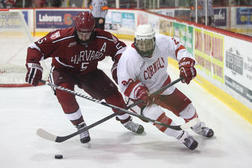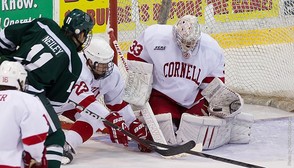There are always two ways of analyzing games. The first is to emphasize the result. Most think that what appears at the top of the boxscore matters most. The other, a view that I have heard at least three respected collegiate hockey coaches embrace, is not to coach by the scoreboard but rather the process that was seen on the ice. These divergent approaches lead to two different conclusions about last weekend and the current trajectory of this Cornell team.
Results
This is the bleak lens of analysis for this Cornell team. Cornell is winless in its last five games. Its record over that span is 0-3-2. Additionally, Cornell dropped a game against its most loathsome rival which makes its most recent streak against the Crimson to one of 0-2-1.
Cornell has averaged 1.60 goals per game over the last five games. Cornell began the season with its first three games averaging 2.67 goals per game. This drop off of offensive production by a factor of 40% has no doubt contributed to the losses that the Big Red has endured as of late. Scoring two goals likely would have resulted in one win over that span while scoring just three goals would have resulted in another win and a tie in regulation over the last five games.
The up-side of emphasizing approaches is that Cornell will have a chance at each opponent to whom it has lost at least one more time to rectify for early-season errors. Cornell took a win out of Colgate and swept Colorado College. All other opponents to whom Cornell had less than ideal results, the Big Red will have a second chance to correct any mistakes and tally a win later in the season. The unpredictability of the ECAC so far this season has provided Cornell the opportunity to reassert its dominance later in the season when ECAC play begins and regain its footing in the Conference, but before then, Cornell will play Michigan at Madison Square Garden.
Process
The Harvard loss felt miserable. I think fans, coaches, and players alike can agree about that. The Dartmouth tie has a duality that made it feel like a loss and a win. It was a win in that it partially got the taste of losing out of our collective mouths. It was a loss in that it was a winnable game even late in the game, much like the Princeton game. This ignores the dynamics of the games.
When one examines the minutia and mechanics of the games, Cornell was very much improved after a very disappointing weekend against the feline travel partners of the ECAC. The two most striking statistics involve trends that Cornell broke against the Crimson and Big Green. Dartmouth came to Lynah Rink averaging four goals per game. The Big Green had scored four goals the evening before against the Raiders in Hamilton. Cornell's defense shut them down and a dependable Andy Iles held them to just one goal.
The Harvard game was just as impressive in many aspects. Cornell limited a Harvard team that averages currently 31.4 shots per game to 17 shots. A total of 17 shots in a game is the lowest number of shots to which the very potent offensive threat of Harvard has been limited all season. Harvard's few opportunities were not great. Harvard scored three goals. The second of which was an unscreened shot almost from the point that Iles would stop cold in almost every situation but for some reason did not manage to do so in this outing.
Senior captain Nick D'Agostino stated after the first weekend's sweep of Colorado College that Cornell hockey is shut-down defense that allows few offensive opportunities and wins special teams battles. The disappointing trip through New Jersey and Connecticut saw the Red's opponents score four power-play goals on 13 opportunities for a kill rate of only 61.5%. This weekend? Cornell faced seven power-play challenges. Cornell generated a kill rate of 100%.
The kill rate and the absolute number of penalties are very telling. Cornell has regained control of its penalty kill after two weeks of absence. Colgate notched only power-play goals against Cornell followed by the noted weekend. The return of a dominant penalty kill over the weekend shows that this team has righted course after two games that were suspect with regard to systemics. The second statistic is important because Cornell was less disciplined than it had been previously and drew many needless penalties against Princeton and Quinnipiac.
Back on Track
Cornell played sounder defense, played with more discipline in terms of systems and not drawing foolish penalties, and delivered more Cornell-worthy penalty kill numbers. If Cornell continues to play with the poise and focus that it did throughout almost all of last weekend, it will be back on track where it was immediately after the Colorado-College series. The results of last weekend were not the turnaround that we wanted, but they were the turnaround that Cornell needed nonetheless.
The sole blemish upon last weekend was the dearth of goal scoring from Cornell. Knisley's goal was a thing of beauty in both timing and style. I feel validated additionally in my initial praise of the Upstate New Yorker in his first game in carnelian and white. His first collegiate goal took the momentum back in that game. The ability to respond both as individual players and moreover as a team cannot be underestimated. It will be important later in the season and in all high-stakes games.
Any naysayers who think that the combined offensive talents of Bardreau, D'Agostino, Ferlin, Knisley, Lowry, McCarron, Miller, Mowrey, and Ryan will be silenced for long are taking a very dangerous bet. The gorgeous (there is no other word to described it) assisting feed from Ferlin to Mowrey in the Dartmouth game showed glimmers of the offensive brilliance that were apparent in the earliest moments of the Colorado-College series. Esposito and Miller have been generating key offensive opportunities as one could expect. Sophomore Lowry has been delivering key hits and fighting passionately to add to his current offensive totals of three goals and two assists.
The lack of goal-scoring is a problem. However, most coaches will agree that of the major problems that can plague a team from special teams to systemic defensive collapses, stagnating goal-scoring is the least worrisome because it is the issue that resolves itself most readily. This team is offensively potent. The goals will come. Cornell with the sound defense it played last weekend and Andy Iles playing like he did on Saturday can win games 1-0 and 2-0, but with offensively talented players like those mentioned, this Big Red team should never have to do so.
There is no stage bigger than the coming Frozen Apple at Madison Square Garden in Manhattan. The games that Cornell has hosted there have been considered the, or among the, biggest spectacles in college hockey. The way that WAFT looks at this and the way that this team should look at this coming weekend is that there is no better place to open the offensive floodgates of scoring than at "the world's most famous arena."
These last two weekends have provided valuable learning experience. This team has fine tuned its efforts after early success and setbacks. It knows now all too well the bad taste of defeat. It knows the trials and tribulations of losing and tying tight games. These last two weekends will prepare the team to be focused later in the season even when all the odds, statistics, and prognosticators think that this team will be favored because after these losses, this team will take nothing for granted. This is not a team that will suffer the losses like those endured in the national tournament in 2009 against Bemidji State or in 2010 against New Hampshire from underestimating its opponents.
The lessons learned will pay off later in the season because this team will take no game for granted or any goals as awarded. The work ethic of this team will prove to be worthy of the Cornell ethos.
We cannot wait to be there among thousands of Cornell fans and Lynah Faithful cheering on this great team at The Garden.





 RSS Feed
RSS Feed
